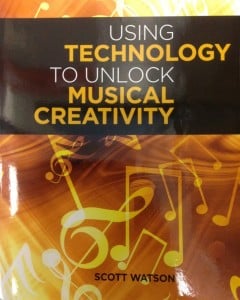I am teaching an intensive 1 week Music Technology course at Oakland University, Rochester MI titled Teaching For Musical Understanding with Technology. Our first reading was chapter 2 from Scott Watson’s book Using Technology to Unlock Musical Creativity.
“In order to be creative, you need to be able to view things in new ways or from different perspectives.” (pg. 15) Being creative or innovative is not always creating a brand new idea, sometimes it is reinventing common things MacGyver was a genius! He could create anything with a rubberband, bobby pin, and a piece of chewing gum. Who would a Musical MacGyver be?
How do we design experiences for musicians to create, reinvent, and innovate in our programs? As I read the teachers reflections to this reading, there are recurring themes emerging.
- There is a tradition of excellence at district and state festival
- My administrator is basing my teacher evaluation on how well the ensemble performs at contest
- I was never taught this way
- I don’t know how
These are going to become the springboards from which the rest of the week’s discussions and projects will launch. This begins with laying groundwork for teachers, administrators, and parents to see other ways, different ways, of being a musician. As one instrumental music teacher in the class wrote, “we must be careful not to throw out the baby with the bathwater”, the changes need to be small and deliberate. Beginning with relevant and timely music that will engage the learner/musician to become more autonomous when approaching musicianship. Autonomy in learning emerges when musicians are asked to solve musical problems through a project based approach.
“Advantages for me as a teacher of creating musical activities include finding the time spent with students to be more enjoyable, perhaps because my role moves naturally to that of a coach and facilitator. I also enjoy the opportunities for personal artistic expression when modeling musical creativity.” (pg. 19)
The experiences that you design for musicians to be creative, artistic, expressive will have a longer lasting effect than the piece of music they are reading and performing. The musicians that visit your classroom may not remember the specific piece they played, the concept, or rhythmic passage you were rehearsing, but they will remember how you made them feel as a creating musician.
My frame for tomorrow’s discussion will be a question I will ask. How do we as music educators create relevant experiences for learner/musicians?
“…technology tools have become indispensable to music makers outside the world of education”. (pg. 20)
This is a cry for help. Technology tools that are absolutely necessary to “real world” music makers are often ignored by contemporary music educators. Where does this leave the musicians in our classrooms?
I would like to ask “What if…” What is music education was different?
What are your “What ifs”?


What if each of our student musicians had an iPad? Those doors to music done differently could be blown wide open! But could this happen in the traditional performing arts class?